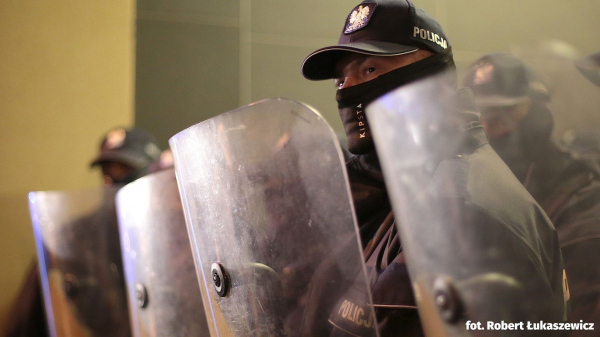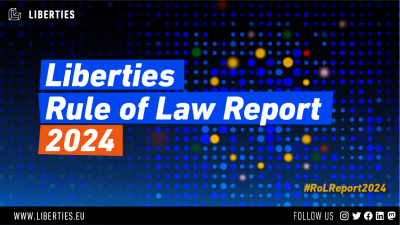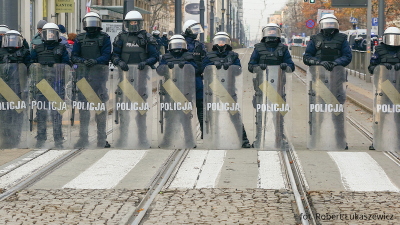
Protests have erupted in Warsaw after the Constitutional Court delivered the so-called judgment on the Ombudsman’s term of office.
Once again, the police have engaged in abusive conduct that may have violated the guarantees under the European Convention on Human Rights.
The Helsinki Foundation sent another letter to the Chief Commissioner of the Police requesting a comment on the incidents covered by the media.
On 15 April 2021, the so-called Constitutional Court delivered a judgment in the case concerning the performance of the Ombudsman’s responsibilities after the end of his five-year term of office. In the evening of the same day, a protest took place in Warsaw, during which the police once again intervened in a way that raises serious proportionality issues.
According to media reports, after about an hour, the police ordered the protesters to leave the area, announcing that the assembly had not been notified and violated pandemic restrictions. Five persons attending this spontaneous assembly have been arrested. The officers making arrests have reportedly abused direct coercive measures – one of the detainees was allegedly handcuffed for many hours, another person’s finger was reportedly broken. Media accounts mentioned the use of batons against the protesters and highlighted their problems with access to a lawyer during the initial hours of detention.
The conduct of officers policing public assemblies may violate the prohibition of torture, inhuman or degrading treatment or punishment and freedom of assembly, says HFHR
In a letter to the Chief Commissioner of the Police, the Helsinki Foundation for Human Rights once again drew attention to the principles governing the use of direct coercive measures – subsidiarity, proportionality and harm reduction. The HFHR recalled that the disregard of these principles may lead to violations of not only the Coercive Measures and Firearms Act, but also Article 3 of the European Convention on Human Rights, which establishes the prohibition of torture, inhuman and degrading treatment or punishment.
The Foundation emphasized that general practices of the police cannot justify any form of brutality and that if a detained person was in good health immediately before the arrest but later suffered an injury, it is incumbent on the state to credibly explain how the injury occurred. According to the case-law of the ECtHR, in the absence of such an explanation, the officers in whose authority the detainee was placed are presumed to be responsible for their injuries.
The HFHR also noted that the disproportionate police intervention took place during a lawful and peaceful public assembly. Such conduct on the part of the police may cause the chilling effect of discouraging prospective protesters from participating in future assemblies.
A police intervention must be proportionate to the threat and the use of any direct coercive measures must be evaluated in terms of necessity, proportionality and reasonableness, in particular concerning those participants in the assembly who did not behave aggressively – the HFHR noted in the letter.
The intervention was taken as part of Covid 19 – Criminal Justice Campaign, a project coordinated by Fair Trials International.


